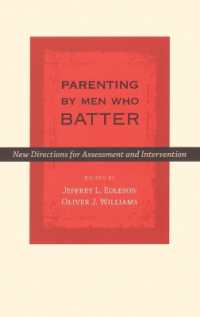- ホーム
- > 洋書
- > 英文書
- > Politics / International Relations
Full Description
Since the collapse of the Soviet Union, nation building and identity construction in the post-socialist region have been the subject of extensive academic research. The majority of these studies have taken a 'top-down' approach - focusing on the variety of ways in which governments have sought to define the nascent nation states - and in the process have often oversimplified the complex and overlapping processes at play across the region. Drawing on research on the Balkans, Central Asia, the Caucasus and Eastern Europe, this book focuses instead on the role of non-traditional, non-politicised and non-elite actors in the construction of identity. Across topics as diverse as school textbooks, turbofolk and home decoration, contributors - each an academic with extensive on-the-ground experience - identify and analyse the ways that individuals living across the post-socialist region redefine identity on a daily basis, often by manipulating and adapting state policy.In the process, Nation Building in the Post-Socialist Region demonstrates the necessity of holistic, trans-national and inter-disciplinary approaches to national identity construction rather than studies limited to a single-state territory.
This is important reading for all scholars and policymakers working on the post-socialist region.
Contents
Introduction
I. Informal Spaces
1. Negotiating Identity in a Multi-Ethnic Classroom: Anthropological Explorations of Everyday School Practices in the Republic of Tatarstan, Russia - Dilyara Suleymanova
2. The Estonian Way of Home-Making: Everyday Visions and Practices from the 1990s to 2000s - Anu Kannike
3. Exploring the Link between National Identity and Perceptions of Citizenship in Georgia - Tinatin Zurabishvili, Tamar Khoshtaria, Natia Mestvirishvili
II. Consumption and Media Spaces
1. Why Nations Sell: Reproduction of Everyday Nationhood through Advertising in Russia and Belarus - Marharyta Fabrykant
2. The Moldovan Media: a Hotbed of Ntionalist Fervour - Onoriu Col?cel
3. Turbofolk as a Means of Identification - Petra Š?astná
III. Border Spaces
1. Ethnic and National Identity of Russian Estonians - Eva Sepping
2. The National and the Religious among Greek Catholic Transcarpathian - Agnieszka Halemba
3. Borders of a Borderland. "Everyday Identities" in the Context of Border Crossings - Ágnes Patakfalvi-Czirják and Csaba Zahorán
IV. Public spaces
1. "But now everywhere is the West:" Cultural Identity in East Berlin after 1989 - Mary Dellenbaugh
2. Staging a Nation: Space and Identities in the Skopje Center - Vessela S. Warner
3. Countryside Revisited: Ethno Villages and Nation-Building in Serbia - Irena Šentevska
Conclusion








